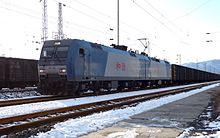Datong–Qinhuangdao railway or Daqin railway (simplified Chinese: 大秦铁路; traditional Chinese: 大秦鐵路; pinyin: Dàqín tiělù), also known as the Daqin line (simplified Chinese: 大秦线; traditional Chinese: 大秦線; pinyin: Dàqín xiàn), is a 653 km coal-transport railway in north China. Its name is derived from its two terminal cities, Datong, a coal mining center in Shanxi province, and Qinhuangdao in Hebei province, on the Bohai Sea.


The electrified double track line serves as a major conduit for moving coal produced in Shanxi, Shaanxi, and Inner Mongolia to Qinhuangdao, China's largest coal-exporting seaport, from there coal is shipped to south China and other countries in Asia.
The railway also passes through the municipalities of Beijing and Tianjin. Unlike most other railways in China, which are run by the state-owned China Railway Corporation, the Daqin railway is operated by Daqin Railway Company Limited, a publicly traded stock company.


Daqin railway carries over 1/5th of the coal transported by rail in China, more coal than any other railway line in China and the world.[1]
The line was constructed in two phases between December 1984 and December 1992, with specifications changed from single-track to double-track during construction.[2] Design capacity was 100 million tonnes a year, which it reached after ten years, but continuous upgrades (wider subgrade, 75 kg/m rails, wagons with higher capacity and top speed, longer trains and stronger locomotives, radio operation and centralised traffic control, automatic train inspection) quadrupled capacity.[3]
In 2006, powerful locomotive models HXD1 and HXD2, with 9.6 MW and 10 MW power output respectively, entered Daqin line to replace the older DJ1 models.
| Year | Coal Transportation Volume (metric tons) |
|---|---|
| ... | |
| 1995 | 20 million[2] |
| ... | |
| 2000 | 60.52 million[2] |
| ... | |
| 2002 | 100 million[3] |
| 2003 | 120 million[4] |
| 2004 | 153 million[5] |
| 2005 | 203 million[5] |
| 2006 | 250 million[6] |
| 2007 | 300 million[7] |
| 2008 | 340 million[3] |
| 2009 | 330 million[8] |
| 2010 | 401 million[9] |
| 2011 | 440 million[10] |
| ... | |
| 2018 | 451 million[11] |
| ... | |
| 2021 | 420 million[12] |
| ... | |
| 2023 | 422 million[13] |
Accidents and incidents
edit24 August 2020 - Four cars of a train derailed near Zhuolu railway station in Zhuolu County, Hebei province. No casualties were reported.[14]
14 April 2022 - 17 cars of a freight train derailed after colliding with a parked locomotive near Cuipingshan railway station in Jizhou District, Tianjin, 11 of which fell off from the elevated railway. No casualties or injuries have been reported.[15][16]
See also
editReferences
edit- ^ "中国大秦铁路已成为全球年运量最大铁路线". CHINANEWS. 2009-06-23. Archived from the original on 2020-02-16. Retrieved 2021-08-07.
- ^ a b c "Dadong–Qinhuangdao Railway Construction Project" (PDF). Archived from the original (PDF) on 2012-02-23. Retrieved 2010-02-06.
- ^ a b c Heavy-haul heavyweight
- ^ Analysis on the High Coal Inventory in Qinhuangdao Port
- ^ a b Railway company wins approval for public offering
- ^ Daqin Railway Carried Over 250 Mn-ton Coal
- ^ Railway Rushed to Transport Power Generation Coal New Type Heavy-loaded Equipments Strut Their Stuff Archived 2011-07-07 at the Wayback Machine
- ^ Daqing Railway sees to handle 380 Mt coal in 2010
- ^ Daqin Railway 2010 Net Profit Up 46% Archived 2011-05-04 at the Wayback Machine
- ^ "Review on China's Coal Transport by Railway in 2011". Archived from the original on 2017-06-29. Retrieved 2012-03-29.
- ^ 网易 (2019-01-09). "大秦铁路:全年运量创新高 高位运行成常态". www.163.com. Retrieved 2022-09-18.
- ^ "千里走"大秦"看能源保供-新华网". www.news.cn. Retrieved 2022-10-13.
- ^ ""中国重载第一路"大秦铁路2023年货运量超4亿吨". www.chinanews.com.cn. Retrieved 2024-01-12.
- ^ "Cargo train derails on China's Datong-Qinhuangdao line - rail authority". Reuters. 2020-08-24. Retrieved 2022-10-13.
- ^ "大秦铁路翠屏山站发生货车溜逸脱线 无人员伤亡". China National Emergency Broadcasting. Retrieved 2022-04-14.
- ^ Cang, Alfred (4 April 2022). "China's Key Coal-Hauling Rail Line Has Collision Between Trains". Bloomberg. Retrieved 2022-10-13.